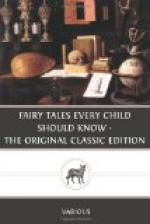She stayed with Benjamin, and helped him in keeping the house clean and cooking the game which the others brought home. Everything was so nicely managed now and with so much order, the curtains and the quilts were beautifully white, and the dinners cooked so well that the brothers were always contented, and lived in great unity with their little sister.
There was a pretty garden around the house in which they lived, and one day, when they were all at home dining together, and enjoying themselves, the maiden went out into the garden to gather them some flowers.
She had tended twelve lilies with great care, and they were now in such splendid bloom that she determined to pluck them for her brothers, to please them.
But the moment she gathered the lilies, her twelve brothers were changed into twelve ravens, and flew away over the trees of the forest, while the charming house and garden vanished from her sight. Now was the poor little maiden left all alone in the wild wood, and knew not what to do; but on turning round she saw a curious old woman standing near, who said to her, “My child, what hast thou done? Why didst thou not leave those white flowers to grow on their stems? They were thy twelve brothers, and now they will always remain ravens.”
“Is there no way to set them free?” asked the maiden, weeping.
“No way in the world,” she replied, “but one, and that is far too difficult for thee to perform; yet it would break the spell and set them free. Hast thou firmness enough to remain dumb seven years, and not speak to anyone, or even laugh? for if ever you utter a single word, or fail only once in the seven years, all you have done before will be vain, and at this one word your brothers will die.”
“Yes,” said the maiden, “I can do this to set my brothers free.”
Then the maiden climbed into a tree, and, seating herself in the branches, began to knit.
She remained here, living on the fruit that grew on the tree, and without laughing or uttering a word.
As she sat in her tree, the king, who was hunting, had a favourite hound, who very soon discovered her, ran to the tree on which the maiden sat, sprang up to it, and barked at her violently.
The king came nearer, and saw the beautiful king’s daughter with the golden star on her forehead. He was so struck with her beauty that he begged her to come down, and asked her to be his bride. She did not speak a word, but merely nodded her head. Then the king himself climbed up into the tree, and bringing her down, seated her on his own horse and galloped away with her to his home.
The marriage was soon after celebrated with great pomp, but the bride neither spoke nor laughed.
When they had lived happily together for some years, the king’s mother, a wicked woman, began to raise evil reports about the queen, and said to the king, “It is some beggar girl you have picked up. Who can tell what wicked tricks she practises. She can’t help being dumb, but why does she never laugh? unless she has a guilty conscience.” The king at first would listen to none of these suspicions, but she urged him so long, and accused the queen of such wicked conduct, that at last he condemned her to be burnt to death.




